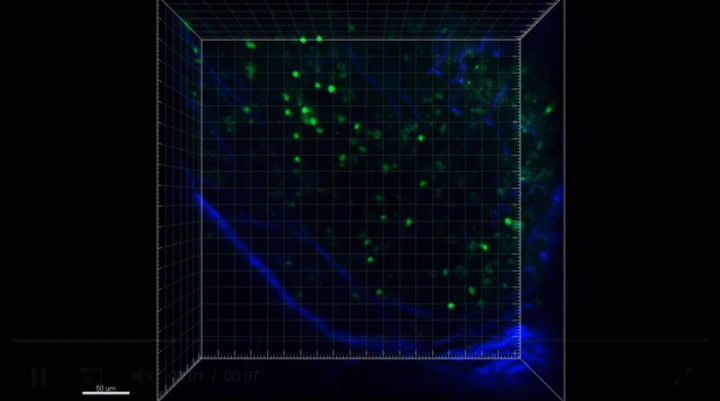Fighting Cancer with Natural Killer Cells
Posted on by Dr. Francis Collins

Credit: Michele Ardolino, University of Ottawa, and Brian Weist, Gilead Sciences, Foster City, CA
Cancer immunotherapies, which enlist a patient’s own immune system to attack and shrink developing tumors, have come a long way in recent years, leading in some instances to dramatic cures of widely disseminated cancers. But, as this video highlights, new insights from immunology are still being revealed that may provide even greater therapeutic potential.
Our immune system comes equipped with all kinds of specialized cells, including the infection-controlling Natural Killer (NK) cells. The video shows an army of NK cells (green) attacking a tumor in a mouse (blood vessels, blue) treated with a well-established type of cancer immunotherapy known as a checkpoint inhibitor. What makes the video so interesting is that researchers didn’t think checkpoint inhibitors could activate NK cells.
Checkpoint inhibitors were thought to activate immune T cells, which makes sense biologically. T cells display a protein on their surface called PD-1. When T cells interact with other cells in the body, PD-1 binds to a protein on the surface of those cells called PD-L1. This protein tells the T cells not to attack. In fact, some cancers evade the immune system by loading up on PD-L1.
Checkpoint inhibitors work by blocking the interaction of PD-1 and PD-L1, freeing up immune cells to fight a cancer. While NK cells can recognize and attack cancer cells, they were not recognized to have PD-1 on their surfaces and thus weren’t expected to respond to a checkpoint inhibitor.
This eye-opening video, part of a recent paper in The Journal of Clinical Investigation, comes from the labs of NIH grantee David Raulet, University of California, Berkeley, and Michele Ardolino, University of Ottawa, Canada [1]. Their mouse studies show that NK cells in the body, including in the blood, spleen, or lymph nodes, generally don’t express PD-1. However, a subset of NK cells inside tumors do.
The researchers went on to demonstrate that checkpoint inhibitors shrunk tumors even in mice that lack T cells. When those mice were depleted of NK cells, however, the anti-cancer effects of checkpoint inhibitors were significantly reduced. The findings help to explain earlier observations that checkpoint inhibitors sometimes work even in people whose cancers aren’t recognized by T cells.
The results are encouraging because NK cells detect cancer cells differently than T cells. It suggests immunotherapies could treat more cancers, including those that T cells don’t recognize.
It will now be important to confirm these findings in human cancers. Ultimately, the researchers hope to learn much more about the factors that turn NK cells “off” and “on.” Perhaps there’s another checkpoint inhibitor pathway that is yet to be discovered? The ultimate dream of this precision medicine approach to cancer is that, one day soon, it will become possible for doctors to profile any patient’s tumor and prescribe the treatments best suited to its precise genetic and immune status.
Reference:
[1] Contribution of NK cells to immunotherapy mediated by PD-1/PD-L1 blockade. Hsu J, Hodgins JJ, Marathe M, Nicolai CJ, Bourgeois-Daigneault MC, Trevino TN, Azimi CS, Scheer AK, Randolph HE, Thompson TW, Zhang L, Iannello A, Mathur N, Jardine KE, Kirn GA, Bell JC, McBurney MW, Raulet DH, Ardolino M. J Clin Invest. 2018 Oct 1;128(10):4654-4668.
Links:
NCI’s Role in Immunotherapy Research (NIH/National Cancer Institute)
Raulet Lab (University of California, Berkeley)
Michele Ardolino (University of Ottawa, Canada)
NIH Support: National Cancer Institute; National Institute of Allergy and Infectious Diseases

Thank you for the exciting update about NK cells and immunotherapy. To be sure, the early work in NK cells was led by the late Dr. Ronald Herberman while at the NCI with significant contributions from Drs. John Ortaldo, Robert Wiltrout and Hap Holden among many others
So, where is the video?
You have to look closely, but it’s a Gif.file that shows the NK cells moving and attacking the tumor.
Using a patient’s own immune system to fight such a deteriorating condition, and even terminal, is probably the best way to deal with cancer, an illness that this year will kill approximately 610,000 lives according to the National Cancer Institute, a government agency. Congrats to these researchers at the University of California at Berkeley. I also hope to see more private investment from pharmaceutical companies to find a cure to some forms of cancer.
If a cancer patient has already gone through chemo can he still go through immunotherapy or has the chemo killed off
those cells too?